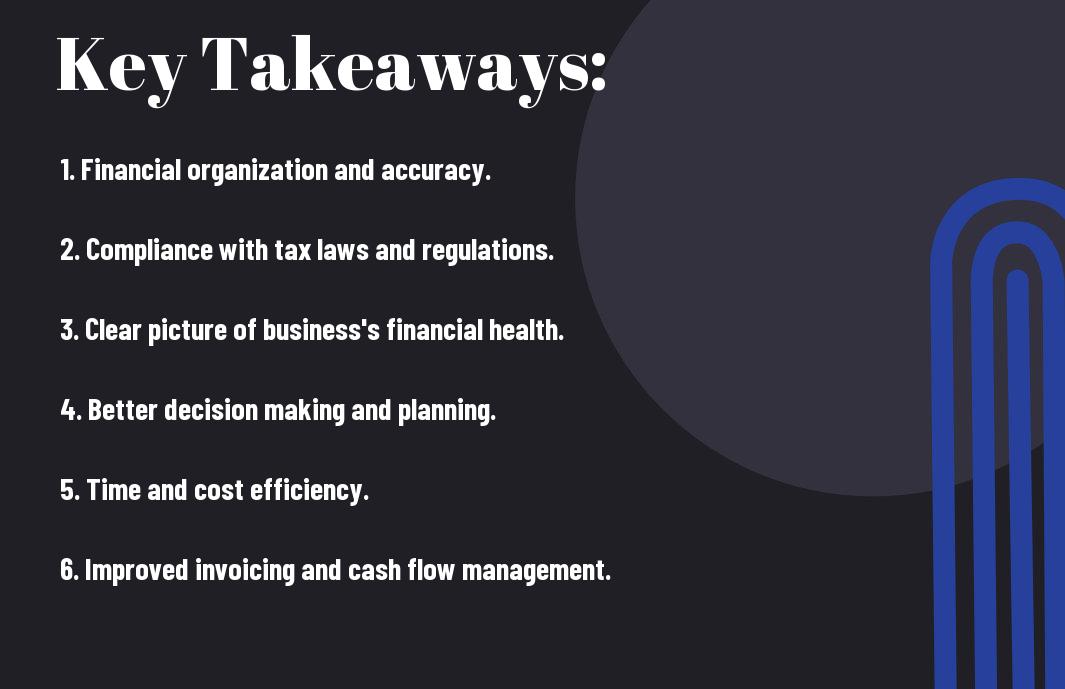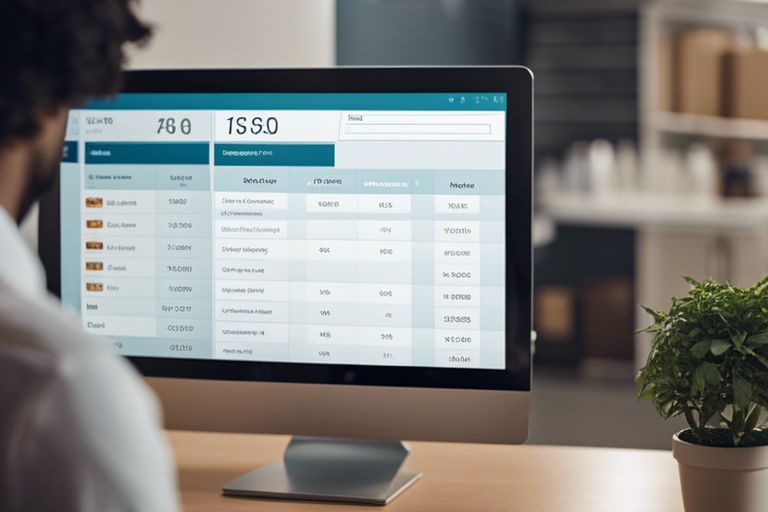Why is it important for small businesses to have a dedicated accounting system in place?
Do you know the critical importance of having a dedicated accounting system in place for your small business? Without a proper system in place, you may find yourself facing costly errors, missed opportunities, and tax penalties. Implementing a dedicated accounting system can significantly streamline your financial processes, provide you with valuable insights into your business’s financial health, and ensure accurate and compliant financial reporting.
With a dedicated accounting system, you can effortlessly track your income, expenses, and cash flow, enabling you to make informed business decisions and proactively manage your finances. Furthermore, having a reliable accounting system in place protects your business from fraud and theft, and prepares you for potential audits or financial reviews. In this blog post, we will explore the crucial reasons why every small business should prioritize implementing a dedicated accounting system to safeguard their financial stability and success.
Key Takeaways:
- Financial Organization: A dedicated accounting system helps small businesses keep track of their income, expenses, and overall financial health. This level of organization is crucial for making informed business decisions and maintaining financial stability.
- Compliance and Reporting: Small businesses are required to comply with various tax and financial reporting regulations. An accounting system can streamline these processes and ensure accurate and timely reporting, helping to avoid penalties and legal issues.
- Business Growth: As small businesses grow, so do their financial complexities. A dedicated accounting system can provide scalability and support the business’s expansion, helping to manage cash flow, inventory, and other financial considerations more effectively.

The Basics of Accounting Systems
Clearly, a dedicated accounting system is essential for the smooth and efficient operation of your small business. With accurate financial records, you can make informed decisions, comply with tax regulations, and track your business’s financial health. In this chapter, we will delve into the basics of accounting systems, including their definition, types, and components.
Definition and Types of Accounting Systems
When it comes to accounting systems, there are two main types: manual and computerized. Manual accounting systems involve using paper ledgers, journals, and spreadsheets to record and track financial transactions. On the other hand, computerized accounting systems utilize accounting software to automate and streamline the process.
- Manual Accounting Systems: This type of system is labor-intensive and prone to errors, but it can be cost-effective for very small businesses with minimal transactions.
- Computerized Accounting Systems: With features such as automated calculations, easy report generation, and data security, computerized systems offer efficiency and accuracy for businesses of all sizes.
Though both types have their pros and cons, computerized accounting systems are increasingly favored for their ability to save time, reduce errors, and provide valuable financial insights.
Components of an Effective Accounting System
An effective accounting system consists of several key components that work together to ensure accurate and organized financial records. These components include chart of accounts, general ledger, accounts receivable and payable, payroll, and financial reporting.
In your small business, having a well-structured chart of accounts will enable you to categorize and track your business’s financial transactions. Your general ledger will serve as the master record of all your financial transactions, while accounts receivable and payable will help you manage incoming and outgoing payments. Additionally, a reliable payroll system will ensure that your employees are paid accurately and on time. With comprehensive financial reporting, you can analyze your business’s performance and make informed decisions for growth and sustainability.
Importance of Accounting for Small Businesses
Your small business may be just starting out, but that doesn’t mean you can afford to overlook the importance of having a dedicated accounting system in place. In fact, having a solid accounting system is crucial to the success and growth of your business. Here’s why.
Financial Tracking and Management
One of the most important reasons to have a dedicated accounting system in place is for financial tracking and management. With a proper accounting system, you can keep track of your business’s income and expenses, monitor cash flow, and make informed decisions about the financial health of your business. By having this information readily available, you can identify areas of success and areas that may need improvement, allowing you to **make informed decisions** to ensure the financial stability and growth of your business.
Legal Compliance and Record Keeping
Another reason why a dedicated accounting system is important for small businesses is to ensure legal compliance and proper record keeping. Maintaining accurate financial records is not only a good business practice, but it is also required by law. By **keeping detailed and organized financial records**, you can ensure compliance with tax laws and regulations, and have the necessary documentation in place for audits or legal matters. This also allows you to **easily access financial records** when needed, making it easier to provide information to stakeholders, potential investors, or creditors.
Benefits of a Dedicated Accounting System
However, simply having an accounting system in place is not enough. The right accounting system tailored to the needs of your small business can provide a range of benefits that can help you make better financial decisions, streamline operations, and ensure the long-term financial health of your company.
Enhanced Decision Making
With a dedicated accounting system, you have access to accurate and up-to-date financial data, allowing you to make informed decisions about the future of your business. Whether it’s deciding on new investments, setting prices for products or services, or identifying areas for cost-cutting, having the right financial information at your fingertips can make all the difference in the success of your business. Additionally, it can help you identify areas of growth and opportunities for expansion, allowing you to take advantage of new prospects as they arise.
Streamlining Financial Operations
Having a dedicated accounting system can help you streamline your financial operations, saving you time and resources. By automating processes such as invoicing, payroll, and expense tracking, you can reduce the likelihood of errors and free up time for you to focus on other aspects of your business. This not only leads to improved efficiency, but also a more organized and professional image for your company.
Long-term Financial Health
Perhaps the most important benefit of a dedicated accounting system is the long-term financial health it can ensure for your business. By keeping a close eye on your financial data, you can identify potential issues early on and take proactive measures to address them. This can help you avoid financial pitfalls that could threaten the survival of your business. Additionally, having accurate financial records can also be essential for securing financing or attracting investors, which are crucial for the growth and sustainability of your small business.
Implementing a dedicated accounting system is an investment in the future of your business, providing you with the tools and insights you need to make informed decisions, streamline your operations, and ensure the long-term financial health of your company.

Challenges Small Businesses Face Without Proper Accounting
Despite the many demands of running a small business, you cannot afford to overlook the importance of having a dedicated accounting system in place. Without proper accounting, you could face a number of challenges that can significantly impact the financial health and success of your business. Let’s take a look at some of the challenges small businesses face without proper accounting.
Cash Flow Management Difficulties
One of the most pressing challenges that small businesses face without proper accounting is the difficulty in managing cash flow. Without an organized system for tracking income and expenses, it becomes challenging to predict future cash flow and plan for financial obligations. This can lead to cash shortages, missed vendor payments, and unnecessary late fees, ultimately hindering business operations and growth. With a dedicated accounting system in place, you can monitor cash flow in real time, develop accurate forecasts, and make informed decisions to better manage your finances.
Potential Taxation and Compliance Issues
Another critical challenge that small businesses may encounter without proper accounting is the potential for taxation and compliance issues. Inaccurate or incomplete financial records can lead to costly tax penalties, audits, and legal implications. Without a solid understanding of tax regulations and financial reporting requirements, you could find yourself in a precarious position. By implementing a dedicated accounting system, you can ensure accurate and timely tax filings, maintain compliance with regulatory standards, and mitigate the risk of facing financial and legal repercussions.
Obstacles in Securing Financing
Without proper accounting, small businesses may encounter obstacles in securing financing from lenders and investors. Inadequate financial documentation and disorganized records can create a lack of transparency and credibility in the eyes of potential funding sources. This can limit your ability to access the capital needed to support business growth and expansion. With a dedicated accounting system, you can provide clear, accurate financial statements and demonstrate your business’s ability to manage and repay financing, enhancing your chances of securing the funding you need.
Implementing an Accounting System in a Small Business
To ensure the financial health and success of your small business, it is essential to have a dedicated accounting system in place. Implementing such a system will enable you to track your company’s finances more efficiently, make informed business decisions, and maintain compliance with regulations. Here’s how you can go about setting up an accounting system for your small business.
Steps to Adopt a Dedicated Accounting System
First, it’s crucial to take stock of your current financial processes and identify any areas that need improvement. This could involve assessing your record-keeping methods, financial reporting, and internal controls. Once you have a clear understanding of your financial operations, you can begin the process of adopting a dedicated accounting system.
You may want to consider seeking professional assistance from an accountant or financial expert to guide you through the implementation process. They can help you set up the necessary accounts, establish financial procedures, and ensure that you are adhering to best practices for small business accounting.
Choosing the Right Accounting Software for Your Business
When it comes to selecting accounting software for your small business, it’s important to choose a solution that aligns with your specific needs and budget. Look for software that offers features such as invoicing, expense tracking, payroll management, and financial reporting. Ensure that the software you choose is user-friendly and provides the level of customization and reporting capabilities that your business requires. You may also want to consider cloud-based accounting software, which offers the advantage of accessibility and real-time data updates.
Training and Resources for Small Business Accounting
As you implement a dedicated accounting system in your small business, it’s essential to invest in the necessary training and resources for yourself and your team. This could involve providing staff members with access to accounting software training programs, hiring an external consultant to provide guidance, or enrolling in accounting courses to enhance your own knowledge and skills. By investing in training and resources, you can ensure that your team is equipped to effectively use the accounting system and handle day-to-day financial tasks more efficiently.

Accounting Best Practices for Small Businesses
After understanding the importance of having a dedicated accounting system in place for your small business, it’s essential to adopt best practices to ensure the efficiency and accuracy of your financial management. Implementing these practices can help you make informed business decisions and maintain a healthy financial position.
Regular Financial Review and Reconciliation
Regular financial review and reconciliation are crucial for the smooth functioning of your small business. By reviewing your financial records regularly, you can identify any discrepancies or errors, helping you maintain accurate financial information. Reconciling your accounts ensures that your financial transactions match your bank records, providing you with a clear picture of your business’s financial health. It also allows you to identify any potential fraud or accounting mistakes that may have occurred.
Planning for Taxes and Future Growth
Proper accounting practices enable you to plan for taxes and future growth effectively. By maintaining accurate financial records, you can easily track your income and expenses, making it easier to calculate and plan for tax payments. Additionally, having a dedicated accounting system in place allows you to analyze your financial data to make informed decisions about future investments, expansion, and strategic growth opportunities for your business.
Outsourcing vs. In-House Accounting
When it comes to managing your accounting needs, you must consider whether to handle it in-house or outsource it to a professional accounting firm. While in-house accounting gives you greater control over your financial data, it can be time-consuming and require significant expertise. On the other hand, outsourcing your accounting needs to a reputable firm can save you time and provide you with expert guidance and support. Evaluate the pros and cons of each option to determine which best aligns with Reasons Why Your Business Should Consider Accounting Integration.
By implementing these best practices, you can ensure that your small business’s accounting system is efficient, reliable, and supports your financial growth and success.
Future Trends in Accounting Systems for Small Businesses
Despite the current accounting systems being efficient, the future trends in accounting systems for small businesses are heading towards more advanced and tech-savvy solutions. These trends are driven by technological advancements and the role of automation and AI. It is crucial for small businesses to stay updated with these future trends to remain competitive and efficient in managing their finances. Let’s take a look at the upcoming developments in accounting systems for small businesses.
Technological Advancements
With the rapid advancement of technology, accounting systems for small businesses are also evolving. The future accounting systems are expected to incorporate cloud-based solutions, blockchain technology, and real-time data analytics for improved efficiency and accuracy. Cloud-based accounting provides the flexibility of accessing financial data from anywhere, at any time, making it easier for you to manage your business finances on-the-go. Blockchain technology offers secure and transparent transaction records, ensuring the integrity of financial data. Real-time data analytics will provide you with valuable insights into your business performance, helping you make informed financial decisions.
The Role of Automation and AI
The future accounting systems for small businesses will heavily rely on automation and AI to streamline processes and eliminate manual tasks. Automation will simplify repetitive accounting tasks such as data entry, invoicing, and reconciliations, saving you time and reducing the risk of errors. AI-based accounting systems will have the capability to learn from historical data and provide accurate predictions and recommendations, enabling you to make strategic financial decisions. These developments will not only increase the efficiency of your accounting processes but also free up your time to focus on other aspects of your business.
Conclusion
Now you understand the importance of having a dedicated accounting system in place for your small business. By implementing an accounting system, you can streamline financial processes, maintain accurate records, and make informed business decisions based on real-time financial data. Furthermore, having a dedicated accounting system can help you save time and reduce manual errors, ultimately leading to improved efficiency and cost savings for your business.
Overall, a dedicated accounting system can provide you with the financial visibility and control needed to drive your small business forward. With the right system in place, you can better manage cash flow, track expenses, and ensure compliance with tax regulations. Taking the time to invest in an accounting system will set you up for long-term success and sustainability in the competitive business world.
FAQ
Q: Why is it important for small businesses to have a dedicated accounting system in place?
A: Having a dedicated accounting system in place is crucial for small businesses as it allows for accurate tracking and monitoring of financial transactions. This ensures compliance with tax regulations and provides an overall picture of the financial health of the business.
Q: What are the benefits of a dedicated accounting system for small businesses?
A: Implementing a dedicated accounting system enables small businesses to streamline their financial processes, reduce errors, and improve decision-making. It also provides a clear overview of cash flow, expenses, and revenue, aiding in budgeting and forecasting efforts.
Q: How can a dedicated accounting system save time and resources for small businesses?
A: By automating repetitive and time-consuming tasks, such as data entry and report generation, a dedicated accounting system can significantly save time and resources for small businesses. It also minimizes the risk of human error and allows for more efficient use of staff expertise in other areas of the business.



